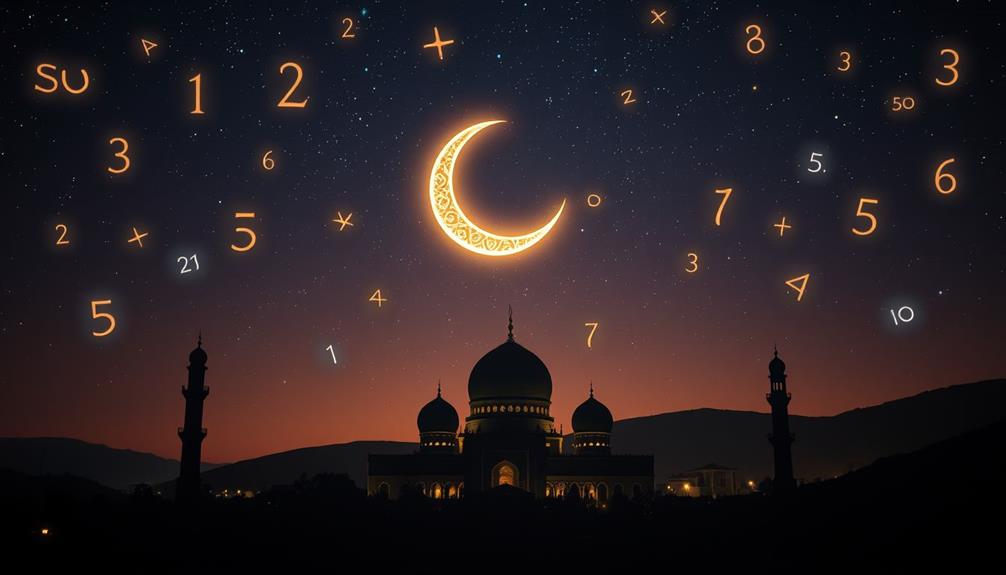Muslims generally don't believe in angel numbers, as they conflict with fundamental Islamic teachings. Angel numbers, seen as spiritual messages, may lead you towards superstition, which is discouraged in Islam. Instead of interpreting numbers, your focus should be on direct communication with Allah through prayer and the Quran. Engaging in practices like numerology can risk shirk, or associating partners with Allah, which is considered a serious sin. For an authentic spiritual experience, rely on the teachings of the Quran and Sunnah, fostering a deeper connection with your faith and understanding its true foundations. Explore more about this guidance.
Key Takeaways
- Muslims generally consider angel numbers as haram, associating them with superstitions and potential shirk (associating partners with Allah).
- Islam emphasizes direct communication with Allah through prayer and Quran recitation instead of interpreting numbers as divine signs.
- The belief in angel numbers contradicts Islamic teachings, which prioritize reliance on Allah for guidance over mystical interpretations.
- Engaging with angel numbers may lead to spiritual harm and confusion, diverting focus from authentic Islamic practices and teachings.
- Authentic spiritual growth in Islam is rooted in established practices like prayer, good deeds, and reflection on the Quran, not in numerology.
Definition of Angel Numbers

Angel numbers are repetitive sequences of numbers—like 111, 222, and 333—that are believed to carry spiritual messages or guidance from the universe or guardian angels. Many people find spiritual significance in these numbers, interpreting them as signs from a higher power or their own intuition. For instance, 1111 often represents new beginnings, while 333 is seen as a symbol of divine support and encouragement.
You might notice that the belief in angel numbers has gained traction among those exploring numerology and metaphysical practices. Different cultures offer unique interpretations of these sequences, viewing them as indicators of spiritual awakening or enlightenment.
However, it's crucial to recognize that despite their allure, angel numbers lack a foundation in traditional religious teachings and might be considered superstitious by some.
From an Islamic perspective, the interest in angel numbers can be intriguing but is often met with skepticism. Many Muslims may not find angel numbers relevant to their beliefs, as they focus more on established teachings and texts. Understanding negative angel numbers is not a priority in Islamic teachings, as the focus is on seeking blessings and guidance from Allah. While some individuals may find personal significance in angel numbers, it is important to remember the core principles of Islam and not allow belief in angel numbers to detract from those beliefs. Instead, Muslims may find more solace in turning to prayer and seeking guidance through established religious practices.
Ultimately, whether you embrace the concept of angel numbers or view them with caution, understanding their definitions and implications can enrich your spiritual journey.
Islamic Perspective on Numerology

Many followers of Islam view numerology, including the concept of angel numbers, with skepticism. In Islamic beliefs and teachings, numerology is generally considered haram, or forbidden. This perspective stems from the idea that attributing specific meanings to numbers can lead to shirk, which is associating partners with Allah—a serious offense in Islam.
Engaging in practices related to numerology is seen as a form of divination that contradicts the reliance on Allah for guidance. The Quran explicitly prohibits seeking knowledge of the unseen and attempting to predict the future through methods like numerology. Instead, it calls for faith in Allah alone.
As angel numbers have gained popularity in various cultures, many Islamic scholars caution against adopting such beliefs, as they can foster superstition. Instead of turning to numerical interpretations, they advocate for seeking knowledge and guidance through prayer, Quranic recitation, and adhering to the teachings of the Prophet Muhammad.
Significance of Numbers in Islam

In Islam, numbers hold significant meaning in various rituals and practices, reflecting the structured nature of worship and the teachings of the Prophet Muhammad. Each number often symbolizes an essential aspect of faith. For instance, during prayers, the number of rakah is predetermined, emphasizing spiritual discipline and the importance of following established guidelines for worship.
The number 786 is commonly used as a representation of "Bismillah" (In the name of Allah), signifying blessings and protection. Additionally, when performing wudhoo (ablution), washing body parts three times illustrates the importance of repetition, focusing on cleanliness rather than any numerological interpretation.
Moreover, the number five stands out as it represents the five pillars of Islam, which are fundamental tenets of faith and practice.
These numbers don't convey hidden meanings or superstitions; instead, they guide you in your rituals and practices, ensuring adherence to the Sunnah.
The Role of Angels in Islam

In Islam, angels act as divine messengers, delivering important revelations from Allah to humanity.
You'll find key figures like Jibril, who brings guidance to the prophets, and Mikail, who guarantees people receive sustenance.
Their roles highlight the essential support and protection angels provide in the lives of believers.
Angels as Divine Messengers
Angels serve as crucial messengers in Islam, carrying out Allah's commands with unwavering obedience. Created by Allah, these beings don't possess free will; they exist solely to fulfill their roles. One of the most notable angels, Jibril (Gabriel), is tasked with delivering divine revelations, including the Quran to the Prophet Muhammad. This act underscores how significant angels are in providing divine guidance to humanity.
In the Islamic faith, belief in angels is one of the six pillars of faith (Iman). Their existence reassures believers of Allah's constant support and guidance. Angels are entrusted with protecting and guiding you, recording your deeds, and assisting in spiritual matters, as outlined in various Quranic verses.
They act as intermediaries between the earthly territory and the divine, reinforcing the connection between you and the spiritual domain. The presence of angels symbolizes divine support, reminding you that you're never alone in your journey.
Role of Specific Angels
Throughout Islamic teachings, specific angels play essential roles that shape your understanding of the divine order. These angels, created from light, carry out Allah's commands without free will, emphasizing the significance of your belief in angels as a core tenet of faith.
Key angels include Jibril (Gabriel), tasked with delivering divine messages to prophets, and Mikail (Michael), who oversees natural phenomena and sustenance. Additionally, two angels are assigned to each person to record every good and bad deed, serving as a reminder of accountability.
Here's a glimpse into their roles:
| Angel | Role |
|---|---|
| Jibril (Gabriel) | Messenger of revelations to prophets |
| Mikail (Michael) | Oversees sustenance and natural events |
| Rakib | Records good deeds |
| Atid | Records bad deeds |
This belief in angels not only reinforces your connection to the divine but also highlights their protective presence in your life. By understanding their roles, you can appreciate the profound impact these celestial beings have on your spiritual journey and daily existence.
Differences Between Angel Numbers and Islamic Teachings

Beliefs about angel numbers sharply contrast with Islamic teachings, emphasizing a clear distinction between spiritual interpretations and reliance on divine guidance. While some people view angel numbers as sequences conveying spiritual messages, Islamic teachings focus solely on seeking guidance from Allah.
In Islam, interpreting numbers as divine signs can lead to shirk, which is associating partners with Allah—a serious offense that contradicts core faith principles.
Islam prioritizes direct communication with Allah through prayer and the Quran. Instead of looking for hidden meanings in numbers, you're encouraged to turn to these sacred practices for support and direction. Engaging with angel numbers is often considered haram, as it may foster superstition and deviate from authentic Islamic teachings. Angel numbers in Islam are believed to be a distraction from the true path of faith. The Quran and the teachings of Prophet Muhammad emphasize the importance of seeking guidance directly from Allah through prayer and supplication. Turning to angel numbers for guidance goes against the fundamental principles of Islamic belief and may lead to undue reliance on entities other than Allah. Therefore, it is important for Muslims to focus on their faith and the teachings of Islam rather than seeking meaning in angel numbers.
The Quran explicitly prohibits the pursuit of knowledge about the unseen and future predictions, reinforcing the distinction between angel numbers and Islamic beliefs.
Potential Risks of Believing in Angel Numbers

Believing in angel numbers poses significant risks that can undermine your spiritual journey. Here are three potential dangers to reflect on:
- Shirk: Relying on angel numbers may lead you to place trust in creations instead of solely depending on Allah for guidance. This can create a dangerous path toward shirk, the associating of partners with Allah.
- Diverted Focus: Engaging with angel numbers often pulls you away from authentic Islamic teachings. This diversion can compromise your spiritual integrity, making it harder to stay rooted in your faith.
- Spiritual Harm: The practice of interpreting angel numbers is often viewed as superstitious in Islam, which can lead to spiritual harm. You might develop a false sense of validation, making you vulnerable to unverified beliefs that stray from Islamic principles.
As you navigate your spiritual path, it's essential to maintain your trust in Allah and the teachings of the Quran.
Spiritual Practices in Islam

Understanding the potential risks associated with beliefs like angel numbers can help clarify the importance of established spiritual practices in Islam. These practices are rooted in the Quran and Sunnah, emphasizing prayer (Salah), fasting (Sawm), charity (Zakat), and pilgrimage (Hajj) as vital acts of worship. Each act is designed to strengthen your connection with Allah and foster a sense of community among believers.
In your daily life, engaging in guidance through prayer is fundamental. Rituals such as wudhoo (ablution) and rakah (units of prayer) follow specific guidelines to maintain spiritual purity and adhere to prophetic traditions. While numbers may appear in these rituals, their purpose is practical rather than mystical. The focus is on the performance of these acts rather than interpreting them for hidden meanings.
Ultimately, the teachings of Islam prioritize good deeds and reciting the Quran over seeking signs or messages from the spiritual domain. Embracing these spiritual practices helps you cultivate a deeper relationship with Allah, reinforcing that the essence of Islamic spirituality lies in devotion, community, and ethical living rather than numerology or supernatural interpretations.
Shirk and Its Implications

Shirk is the act of associating partners with Allah, and it's viewed as one of the gravest sins in Islam.
When you start relying on angel numbers for guidance, you risk falling into shirk by placing trust in something other than Allah.
Understanding the consequences of shirk is essential for maintaining your faith and ensuring a direct relationship with the divine.
Definition of Shirk
In Islam, the concept of associating partners with Allah, known as shirk, represents a significant transgression that threatens the core principle of monotheism.
Understanding shirk is essential for maintaining the integrity of your faith and ensuring that you're truly worshiping Allah alone. Here are three critical points to reflect on:
- Definition: Shirk is defined as the act of elevating created beings or concepts to a status that challenges Allah's uniqueness.
- Spiritual Deviation: Engaging in practices that distract from worshiping Allah alone can lead to spiritual deviation, weakening your reliance on His guidance.
- Quranic Emphasis: The Quran stresses the importance of avoiding superstitious practices, like interpreting angel numbers, which can mislead you from the true essence of faith.
Consequences of Shirk
The implications of engaging in shirk are profound and far-reaching, impacting both spiritual health and your relationship with Allah. When you associate partners with Allah, you risk losing sight of true faith. Shirk is considered one of the gravest sins in Islam, and without sincere repentance, it can lead to eternal damnation.
By seeking guidance from numbers, like angel numbers, you may unintentionally elevate creation over the Creator, which contradicts the core tenet of worshiping Allah alone. The consequences of shirk extend beyond mere belief; they can result in spiritual harm and a deviation from the true path.
You might find yourself cut off from divine guidance and mercy, leaving you vulnerable to doubt and despair. Islamic teachings emphasize the importance of maintaining the integrity of your faith, urging you to avoid intermediaries and focus solely on Allah.
Being aware of the implications of shirk is vital for your spiritual journey. It helps you reinforce your commitment to worshiping Allah exclusively and fosters a deeper connection with Him, ensuring that you remain steadfast in your beliefs and aligned with the true essence of Islam.
Alternatives to Angel Number Beliefs

Many people seek guidance in their lives, often turning to concepts like angel numbers for insight. However, there are alternatives within Islamic teachings that support your spiritual growth and connection with Allah.
Here are three key practices to contemplate:
- Prayer (Salah): Engaging in regular prayer helps strengthen your relationship with Allah and provides a direct line of communication for guidance.
- Quran Recitation: Seeking knowledge through the Quran allows you to reflect on its teachings and apply them to your life, fostering personal development.
- Tawakkul: Placing trust in Allah empowers you to find peace and direction without relying on superstitions like angel numbers.
Instead of focusing on numerology, Islam encourages you to invest in acts of worship and good deeds.
These practices nurture your faith and community ties, emphasizing that true spiritual growth comes from adherence to the Sunnah and personal reflection.
Personal Reflections on Spirituality

When you reflect on your personal spiritual experiences, you might notice how faith and guidance play essential roles in your journey.
Trusting in Allah's divine wisdom can lead to a deeper understanding of your purpose and connection to your beliefs.
Instead of seeking external signs, focusing on your relationship with Allah can provide a more fulfilling spiritual experience.
Personal Spiritual Experiences
Exploring personal spiritual experiences often reveals a rich tapestry of beliefs and practices among Muslims. You may find that individual interpretations of spirituality can vary widely, leading to distinct paths. Here are three key insights to reflect upon:
- Many Muslims emphasize the significance of personal prayer and reflection as a direct connection to Allah, valuing it over external symbols like angel numbers.
- Divine guidance can manifest through personal events or circumstances, where you might interpret a situation as a message from Allah rather than relying on numerical symbolism.
- The belief in angel numbers can create a divide; some find comfort in these interpretations, while others see them as distractions from core Islamic teachings.
In your journey of spiritual insight, it's crucial to remember that authentic guidance is often rooted in the Quran and the Sunnah. Engaging in personal prayer and reflection allows you to cultivate a deeper connection with Allah, fostering a sense of peace and clarity in your life.
Ultimately, your understanding of spirituality can be shaped by your experiences and the teachings you prioritize, forming a unique perspective that resonates with your beliefs.
Faith and Guidance
Finding faith and guidance in your spiritual journey often requires a deep commitment to authentic practices rooted in Islamic teachings. Instead of looking for external signs like angel numbers, focus on strengthening your relationship with Allah through prayer, Quran recitation, and good deeds. This direct communication fosters a sense of spiritual direction that remains unwavering.
| Practice | Purpose | Benefits |
|---|---|---|
| Daily Prayer | Establish connection with Allah | Enhances faith and peace |
| Quran Recitation | Seek divine guidance | Deepens understanding of teachings |
| Good Deeds | Strengthen community ties | Cultivates empathy and gratitude |
| Sincere Worship | Devote yourself fully to Allah | Fosters inner tranquility |
Engaging with concepts like angel numbers may lead you away from core Islamic principles. It's crucial to focus on authentic practices that deepen your faith. By investing in spiritual growth through sincere worship and adherence to Islamic teachings, you'll find the true guidance you seek, rooted in your unwavering trust in Allah.
Trusting Divine Wisdom
Trusting in divine wisdom is essential for traversing your spiritual journey as a Muslim. Instead of seeking validation through concepts like angel numbers, focus on the guidance that Allah provides through Islamic practices.
Here are three key aspects to reflect upon:
- Prayer: Regularly engaging in prayer (Salah) connects you directly with Allah, reinforcing your faith and reliance on His wisdom.
- Quranic Teachings: Reflecting on Quranic verses helps you find clarity and purpose, steering you away from superstitions like numerology.
- Good Deeds: Strengthening your relationship with Allah through good deeds aligns your actions with His divine will, fostering a deeper spiritual connection.
Engaging deeply with these elements of your faith fosters trust in Allah's ultimate knowledge.
By prioritizing authentic Islamic practices, you can avoid distractions that might lead to misunderstandings of divine communication.
Remember, truly trusting divine wisdom means relying solely on Allah for direction, embracing the teachings of the Quran and the Sunnah.
Allow this deep connection to guide your spiritual journey, free from the noise of external validation.
Frequently Asked Questions
Can Muslims Believe in Angel Numbers?
You might find comfort in patterns like repetitive numbers, but engaging with angel numbers isn't encouraged in Islam. Focus on strengthening your connection with Allah through prayer and Quranic teachings instead of seeking guidance from numerology. Exploring multiple angel numbers can lead to distraction from your faith and the teachings of the Quran. Islam encourages believers to seek guidance and solace from Allah alone, trusting in His wisdom and mercy. By staying focused on the principles of Islam, you can find peace and guidance in a way that aligns with your religious beliefs. Remember, true comfort and guidance comes from strengthening your connection with Allah, not from seeking signs in numbers.
Do Numbers Have a Significance in Islam?
In Islam, numbers do hold significance, especially in rituals like prayer and wudhoo. However, it is crucial to focus on established practices rather than seeking hidden meanings, which can lead to superstition and distract from faith.
What Does Islam Say About Numerology?
In Islam, numerology's like chasing shadows; it's considered haram. You're encouraged to rely on Allah's guidance instead of seeking knowledge of the unseen through numbers, as it can lead to misguided beliefs and superstitions.
What Do Muslims Believe About Angel?
Muslims believe angels are Allah's created beings, serving as messengers without free will. They fulfill divine commands and play an essential role in faith, emphasizing direct communication with Allah rather than interpreting any numerical signs.
Conclusion
In the tapestry of faith, numbers can weave intricate patterns, yet in Islam, the threads of belief guide you toward understanding divine messages through prayer and reflection. While angel numbers may shimmer like distant stars, remember that true illumination comes from the heart's connection to Allah. Embrace the symbols around you, but let your spirit soar through the teachings of Islam, where every moment holds the potential for deeper meaning and connection with the Divine.










